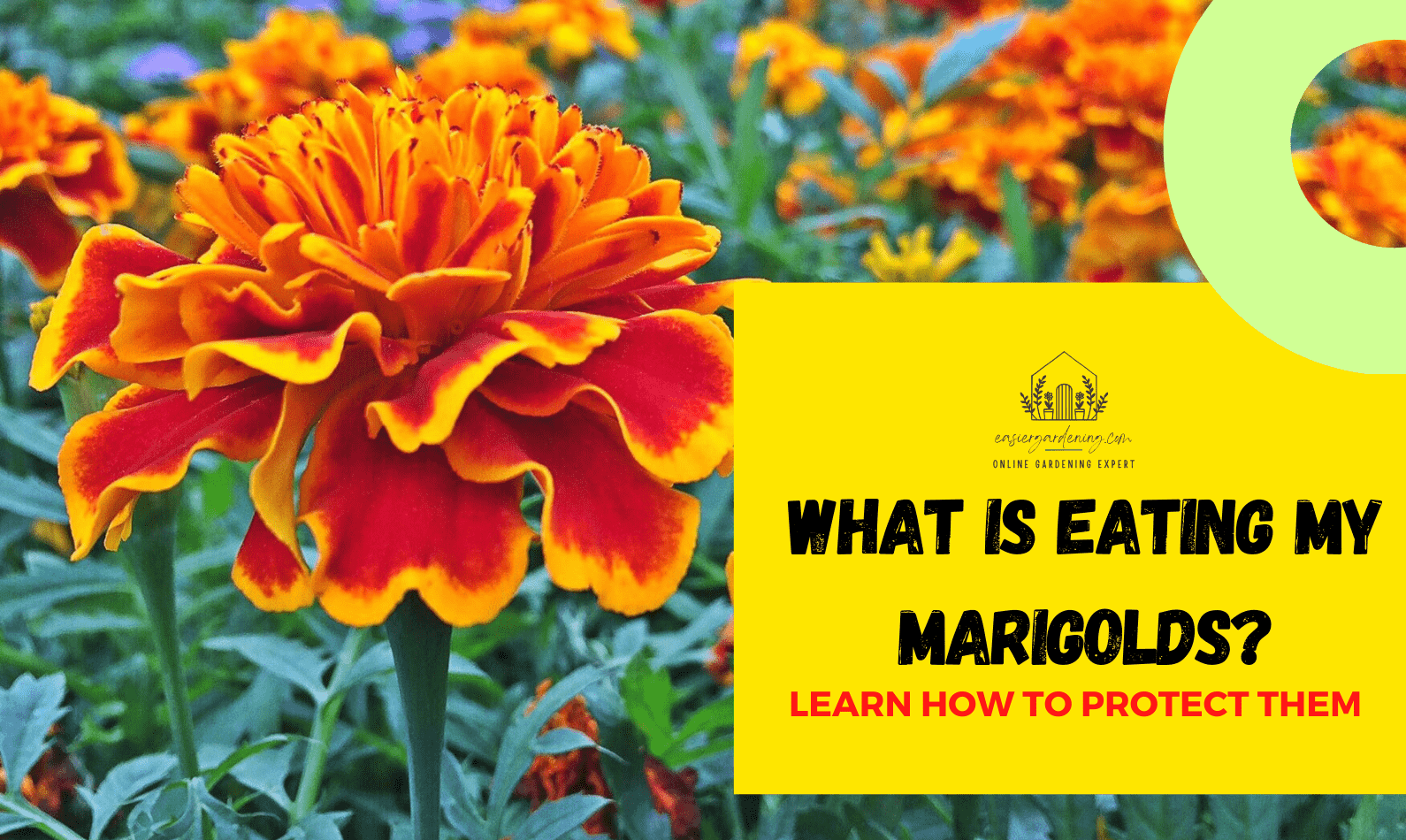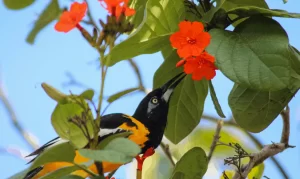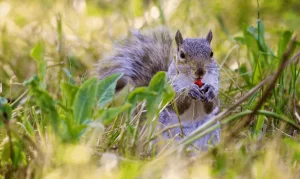What Is Eating My Marigolds? How to Protect them: Marigolds (Tagetes spp.) often appear on the list of insect-resistant plants. These colorful flowers bloom from spring to fall and usually grow from 6 inches to 4 feet tall. Although marigolds have a pungent smell and can deter most pests, some pests still think they are delicious.
If you find that your marigolds are destroyed before you get the chance to enjoy their beauty, then you might be wondering, “what is eating my marigolds?”. Well, it can either be animals or insects. The best thing about marigold is that it is called an insect repellent because Some animals and insects generally find its smell unpleasant and disgusting. So, you can determine which animals or pests are eating your marigolds very easily.
Contents
What Is Eating My Marigolds? Which Pests or Animals Can Possibly Attack?
As we have mentioned earlier most insects find the smell of marigolds very disgusting so the following can make the possible attacks on your marigolds:
- Slugs
- Grasshopper
- Birds
- Rabbits
- Spider Mites
- Diseases
Slugs
Slugs are famous garden predators. It is one of the most common marigold pests. If you have a bunch of slugs in your garden, they will quickly destroy your marigolds. Although marigolds can block pests in the garden, slugs are still attracted to them and like to eat marigolds.
You can determine whether the slug has eaten your marigolds by analyzing the leaves and petals. If the leaves and petals appear to be eaten in half and have irregular shapes, this is evidence of typical slug eating habits. You can also look for traces of slugs on the ground, which look like linear grooves in the soil. It is challenging to catch slugs that eat marigolds because they mainly come out at night or in a humid environment.
Expert Tips:
- If you are searching for how to protect marigolds from pests, especially from slugs, wait till nighttime.
- Use a flashlight to pick off the unwanted predators of your garden.
- Use a bucket full of soapy water to terminate them.
Grasshopper
Grasshoppers can be possible criminals when you are searching for the answer to “What is eating my marigolds?”. When grasshoppers attack your garden, they will eat the whole plant, from leaves to stems. The grasshopper comes out during the day and can rest on your marigold while eating them. Their jumping ability allows them to reach tall marigolds and roost on them. You can prevent grasshoppers by using the usual grasshopper predators in the garden.
Birds
While you are searching for “what is stripping my marigolds”, “birds can also be the possible culprit. Birds tend to peck on marigolds and other flowers. Although birds generally don’t eat marigolds. But some birds, especially crows and blackbirds, tear up marigolds for no reason.
Blackbirds are attracted to marigolds and peck at the petals. If your marigold looks like it has missing petals, but it doesn’t look like it’s been eaten up, and there are holes in the petals and leaves, it is likely that the bird admired the marigold with its beak and flew away with the discovery.
A possible reason for this unwanted behavior from birds is maybe; they are looking for insects on your marigolds. You can protect your marigolds from being attacked by birds by covering your garden with nets or cages. If the birds continue to tear your marigolds, use a scarecrow: hang shiny ribbons or CDs on the fence or nearby branches. Move them often to make the birds uncomfortable.
Rabbit
Are you worried thinking, “What is killing my marigolds?” Well, the rabbit also eats marigolds. You can be sure of rabbit damage to your marigolds by observing the rabbits themselves, their feces, or the plants being bitten. You can restrict the rabbits from entering the plants by fencing around your garden or using rabbit repellents. Fences can prevent rabbits from entering the garden, but if you don’t want to see walls around your marigolds, you can try using ready-made rabbit sprays.
Expert Tips: Remember, marigolds are edible, but once you spray chemical repellents, you won’t be able to eat them. So, it will be better to use the fence to protect marigolds from rabbit attacks.
Spider-Mites
Spider mites are another possible answer to your question, “what is eating my marigolds?” They are unrecognizable due to their tiny size, but they can damage marigolds heavily. Spider mites have nothing to do with insects but are related to ticks and spiders. They have eight legs, and they develop into spider mites when they become adults. They feed on flowers by sucking the liquid in plant cells. As a result, you will see pale spots on your marigolds and petals. Too many spider mites will turn everything yellow and kill your entire marigold garden, as well as other plants, you can check the best spider mite killer
Disease
Wilt disease is not likely the reason for your marigolds being eaten, but it can cause marigolds to grow poorly. Verticillium wilt is triggered by a fungal poison that attacks the roots of marigolds. Pay attention to the withered plants during the growing season. Excavate the infected marigolds, including the roots, and destroy them by incineration or aerophilic composting. After the excavator is used, it should be cleaned and soaked in 10% bleach for two minutes for disinfection.
Learn more about the best way to get rid of spider mites during flowering
Expert Tips: To prevent Verticillium from wilting, avoid using herbicides, nitrogen-rich fertilizers, moist soil, and digging outgrowing marigolds.
Final Thought: What Is Eating My Marigolds?
The list of possible suspects for your concern about “what is eating my marigolds?” is not so long. It’s easier to find the likely culprit as most insects, pests, or animals don’t find the marigolds edible for them. Only a few, including slugs, birds, grasshoppers, rabbits, etc., are interested in your marigolds. To prevent the attack on your marigolds, you can fence around your garden, you can use nets on top of your garden, or you can use chemicals. But the experts are heavily against using chemicals. Chemicals make your marigold non-edible, as well as these, are harmful to nature.




